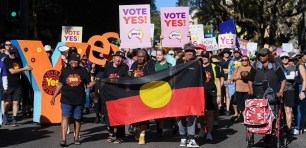
Placards are seen during the launch of Victoria’s 'no' campaign in Melbourne, Friday, September 15, 2023. Source: AAP Image/Diego Fedele
My wife and I started our small professional services-based business in 2006. While our original intent was to seek ‘self-employment’ alone we have organically grown to nine people to effectively service our clients. We started our business as we were keen to exit the corporate world (and all its baggage) and try to gain more meaning and control in our working lives.
When making business decisions (in fact all decisions) we use an approach that I read in an article by an Anglican Minister. He stated that the following approach should always be taken;
1. Empirical evidence
2. Logical thinking
3. Gut feel
This approach has enabled our small business to steadily grow and perform profitably today. Many times I have wanted to skip this process and make a decision because it felt ‘right’ in my ‘gut’. Being forced however to perform steps 1 and 2, it became obvious when a decision was ‘gut’-based and did not stand up to scrutiny.
Everything I see, hear and read about The Voice is based on feelings. The facts appear to play a very small role. A quick search on Google will show there are currently over 250 Indigenous tribes (or mobs) with up to seven clans in each tribe. Each tribe is self-governing and has its own language. Does The Voice really represent this vast group of diverse people or does it represent the vocal minority?
As small business owners, we often have to push past our feelings and look at the information available to us. We are very fortunate; in that we live at a time when there is significant information available to those who care to make the effort to look for it. A few minutes of research into “Uluru Statement from the Heart” will reveal that it is seeking three things;
Step 1 – A Voice
Step 2 – A Treaty
Step 3 – A Truth
Do the Australian people realise that The Voice is just the first step? What do the next steps even mean? The attached document from the NIAA website provides some insight into what the Treaty means (refer to page 11). “Treaty must include: Land and sea rights, a fixed percentage of Gross National Product. Rates/land tax/royalties, Right to self-determination, Timeline to achieve, Aboriginal control”. Why don’t we add this to the coming Referendum and see how people feel about it?
Small businesses can only thrive in an environment that has a stable government where rules of trading and employment are consistent, understood and based on logical well-structured platforms. We already have enough problems dealing with laws, awards and processes that are way too complex. Adding another layer of government and further empowering a minority group of diverse peoples that do not understand democratic processes has the potential to hinder/destroy business.
We live in a time of significant change. If we cannot accept change then we cannot survive in a society. Change must be for the benefit of its audience. Like modern awards, it would be great if all change was subject to the BOOT test — Better off Over All. I don’t believe anybody will be better off if The Voice referendum is successful, as I believe it will drive self-interest for a vocal minority and not be of benefit to the vast majority of Australians, including most Indigenous people.
Based on this a No vote is mandatory for all people who want to live in the dynamic society that is Australia.
Ray Blanch is a principal at Samsara Solutions.
Handpicked for you

Opinion: A call for small businesses to come together and vote Yes to the Voice



COMMENTS
SmartCompany is committed to hosting lively discussions. Help us keep the conversation useful, interesting and welcoming. We aim to publish comments quickly in the interest of promoting robust conversation, but we’re a small team and we deploy filters to protect against legal risk. Occasionally your comment may be held up while it is being reviewed, but we’re working as fast as we can to keep the conversation rolling.
The SmartCompany comment section is members-only content. Please subscribe to leave a comment.
The SmartCompany comment section is members-only content. Please login to leave a comment.